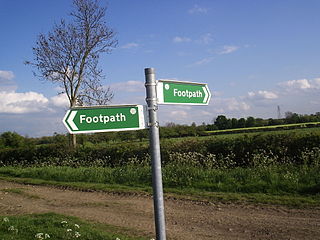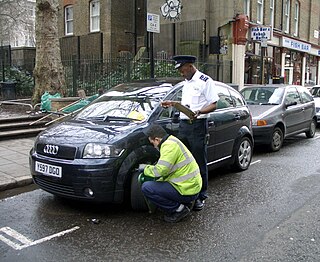
The Wildlife and Countryside Act 1981 is an Act of Parliament in the United Kingdom implemented to comply with European Council Directive 79/409/EEC on the conservation of wild birds. In short, the act gives protection to native species, controls the release of non-native species, enhances the protection of Sites of Special Scientific Interest and builds upon the rights of way rules in the National Parks and Access to the Countryside Act 1949. The Act is split into 4 parts covering 74 sections; it also includes 17 schedules.
A by-law, or as it is most commonly known in the United States bylaws, is a set of rules or law established by an organization or community so as to regulate itself, as allowed or provided for by some higher authority. The higher authority, generally a legislature or some other government body, establishes the degree of control that the by-laws may exercise. By-laws may be established by entities such as a business corporation, a neighbourhood association, or depending on the jurisdiction, a municipality.

In England and Wales, excluding the 12 Inner London boroughs and the City of London, the right of way is a legally protected right of the public to pass and re-pass on specific paths. The law in England and Wales differs from Scots law in that rights of way exist only where they are so designated, whereas in Scotland any route that meets certain conditions is defined as a right of way, and in addition, there is a general presumption of access to the countryside. Private rights of way or easements also exist.

A parking enforcement officer (PEO), traffic warden, parking inspector/parking officer, or civil enforcement officer is a member of a traffic control agency, local government, or police force who issues tickets for parking violations. The term parking attendant is sometimes considered a synonym but sometimes used to refer to the different profession of parking lot attendant.

The Licensing Act 2003 is an act passed by the Parliament of the United Kingdom. The act establishes a single integrated scheme for licensing premises in England and Wales used to sell or supply of alcohol, provide regulated entertainment, or provide late night refreshment. It allows some or all of these licensable activities to be contained in a single licence—the premises licence—that replaced other schemes. Responsibility for issuing licences is given to local authorities, specifically London boroughs, metropolitan boroughs, unitary authorities, and district councils, who took over this power from the justices of the peace under a system of licensing committees. It came into effect midnight, 24 November 2005.

The Canadian Environmental Protection Act, 1999 is an act of the 36th Parliament of Canada, whose goal is to contribute to sustainable development through pollution prevention and to protect the environment, human life and health from the risks associated with toxic substances. It covers a diversity of activities that can affect human health and the environment, and acts to address any pollution issues not covered by other federal laws. As such, the act is a "catch all" piece of legislation that ensures potentially toxic substances are not inadvertently exempt from federal oversight as a result of unforeseen legislative loopholes.
In the United Kingdom, a fixed penalty notice (FPN) is a notice giving an individual the opportunity to be made immune from prosecution for an alleged criminal offence in exchange for a fee. Fixed penalty notices were introduced in Britain in the 1980s to deal with minor parking offences. Originally used by police and traffic wardens, their use has extended to other public officials and authorities, as has the range of offences for which they can be used.

The Health and Safety at Work etc. Act 1974 is an act of the Parliament of the United Kingdom that as of 2011 defines the fundamental structure and authority for the encouragement, regulation and enforcement of workplace health, safety and welfare within the United Kingdom.

The Town and Country Planning Act 1990 is an act of the United Kingdom Parliament regulating the development of land in England and Wales. It is a central part of English land law in that it concerns town and country planning in the United Kingdom. Repealed in parts by the Planning and Compensation Act 1991, it is now also complemented by the Planning and Compulsory Purchase Act 2004.
A tree preservation order (TPO) is a part of town and country planning in the United Kingdom. A TPO is made by a local planning authority to protect specific trees or a particular area, group or woodland from deliberate damage and destruction if those trees are important for the amenity of the area. In Scotland TPOs can also be used to protect trees of historic or cultural significance. TPOs make the felling, lopping, topping, uprooting or otherwise willful damaging of trees without the permission of the local planning authority a legal offence, although different TPOs have different degrees of protection.
Section 91(27) of the Constitution Act, 1867, also known as the criminal law power, grants the Parliament of Canada the authority to legislate on:
27. The Criminal Law, except the Constitution of Courts of Criminal Jurisdiction, but including the Procedure in Criminal Matters.

Decriminalised parking enforcement (DPE) is the name given in the United Kingdom to the civil enforcement of car parking regulations, carried out by civil enforcement officers, operating on behalf of a local authority. The Road Traffic Act 1991 (c. 40) provided for the decriminalisation of parking-related contraventions committed within controlled parking zones (CPZ) administered by local councils across the UK. The CPZs under the control of the local councils are also referred to as yellow routes and they can be easily identified with yellow lines marked on the roads with relevant time plates. Councils employ parking attendants to enforce their CPZs directly.
The history of fire safety legislation in the United Kingdom formally covers the period from the formation of the United Kingdom of Great Britain and Ireland in 1801 but is founded in the history of such legislation in England and Wales, and Scotland before 1708, and that of the Kingdom of Great Britain from 1707 to 1800.

The Psychoactive Substances Act 2016 is an Act of the Parliament of the United Kingdom intended to restrict the production, sale and supply of a new class of psychoactive substances often referred to as "legal highs". The bill was given Royal Assent on 28 January 2016, and came into force on 26 May 2016 across the entire United Kingdom.
Since the late 1970s, the European Union's (EU) policy has been to develop and drive appropriate measures to improve air quality throughout the EU. The control of emissions from mobile sources, improving fuel quality and promoting and integrating environmental protection requirements into the transport and energy sector are part of these aims.

The Health Protection (England) Regulations 2020 is a statutory instrument (SI) enacted on 18 July 2020 by the Secretary of State for Health and Social Care, Matt Hancock, in response to the COVID-19 pandemic. It allowed a local authority to make directions relating to premises, events and outdoor public spaces in its area, supplementing central government powers relating to public outdoor places that were granted to the Secretary of State on 3 July in The Health Protection (England) Regulations 2020. In practice, the regulations allowed local authorities to close shops and outdoor public spaces, and to cancel events. The regulations related to England only.

The Health Protection (England) Regulations 2020 is an English statutory instrument made on 3 November 2020 by the Secretary of State for Health and Social Care, Matt Hancock, in response to the COVID-19 pandemic.

The Health Protection (England) Regulations 2020 is an English statutory instrument that empowered local authority officers to issue legally-binding notices to anyone found to be contravening one of the emergency coronavirus provisions. Notices could require remedial action and the closure of premises. Failure to comply was an offence, and could be dealt with by the courts or by issuance of a fixed penalty notice.

The Health Protection (England) (Amendment) Regulations 2021 is an emergency statute in response to the COVID-19 pandemic in England, which came into force at 5.00pm on 29 January 2021.

The Health Protection (England) Regulations 2021 is a statutory instrument (SI) made on 13 December 2021 in response to the COVID-19 pandemic. The regulations, which covered England only, were introduced following increasing concerns about the Omicron variant. They mostly came into effect on 15 December 2021 and expired on 26 January 2022.






